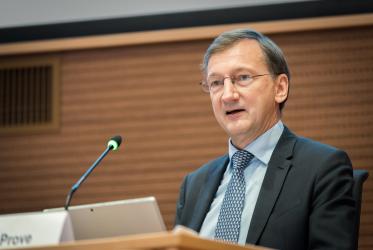WCC general secretary's reflections on Pope Francis' message for the World Day of Peace at the inter-religious service at the St. Nicolas de Flue church
Your Excellencies, Sisters and Brothers, dear Friends,
With his message for the World Day of Peace, His Holiness Pope Francis calls all of us to join hands as sisters and brothers of one human family and to work together for peace and justice in this world that we share. Pope Francis speaks of the value and practice of fraternity. I often summarize the unique qualities of the relationships we have and are called to nurture in the WCC with the word: solidarity.[i]
As Saint Paul writes: “No part of the body can say to another: ‘I have no need of you.’“ Like fraternity, Christian solidarity in the light of the cross of Christ represents a strong biblical principle. It is in this solidarity with the groaning world that we pray and live our faith. Christian solidarity is not exclusive, and cannot mean being against others.
I am extremely thankful that Pope Francis himself walks the talk and takes, for instance, very concrete and clear initiatives for peace in Syria, indeed the whole region of the Middle East and other burning places of our world. My service as general secretary of the World Council of Churches (WCC) has taught me that I cannot speak about peace and justice in abstract terms but have to respond every day in practical and concrete actions to the calls that reach us from churches and others of the crises and conflict-stricken areas of this world.
Therefore, these days I take every opportunity to underline the urgent need for an end to violence and a committed peace process in both Syria and South Sudan. Killing must stop and enemies need to recognize that they first of all belong to one human family and therefore need to be in dialogue with each other before they define themselves by other identities as different and separate of each other. This was already underlined by previous popes, but I see Pope Francis insisting to speak in stronger terms on the consequences such mutual belonging must have for dialogue and reconciliation that lead to real fraternal relationships.
It is decisive for the future of the churches that they engage together unambiguously for peace and that they do this in openness and partnership with representatives of other religions, in these two cases especially of Muslim communities.
As a fellowship of Christian churches, the WCC is affected by the on-going suffering of our member churches and continues to be involved at local, national and international levels through the network of member churches and our partners in all continents. We have an obligation to act as a matter of our faith. We are grateful for the specific gifts and opportunities of working for peace through the world-wide community we are. I am committed to strengthen our cooperation with the Roman Catholic Church wherever required and possible. And I am stretching out my hand to build stronger relationships for peace and justice with leaders of other religious communities.
We do have the experience that fraternal relationships and friendships across boundaries are indeed a “foundation and pathway to peace” and can “extinguish war”. The World Council of Churches gathered here in Geneva representatives of anti-Nazi resistant movements already in 1944 to discuss a future for Europe that would bring the nations of Europe together in working for peace and reconstruction, contributing to the discussion that brought about the European Union. Churches bridged the divide of the Iron Curtain, working for understanding and peace and contributing to the fall of the Berlin wall in 1989. The WCC hosted peace negotiations for Sudan in 1972 and since then has been committed to contribute to peace in this war-torn region. The WCC accompanied work for peace and reconciliation in South Africa and Central America. I personally led a delegation to the north of Nigeria together with Cardinal John from Abuya and His Royal Highness Prince Ghazi of Jordan – Christians and Muslims together searching for pathways to peace. And there are many other examples that I could share with you from my experience as general secretary of the WCC.
During our recent assembly that was held in November last year in Busan, Republic of Korea, we visited the Demilitarized Zone and gathered in prayer for peace at the border of this still divided country. The assembly also agreed on a statement on The Way to Just Peace. Let me conclude with a quotation taken from this statement:
Peace constitutes a pattern of life that reflects human participation in God’s love for all creation.
Together we commit to share God’s love for the world by seeking peace and protecting life. We commit to transforming how we think about peace, how we pray for peace, how we teach peace to young and old and deepen our theological reflections on the promise and practice of peace.
Together we commit to protect human dignity, practice justice in our families and communities, transform conflicts without violence and ban all weapons of mass destruction.
In its message, the assembly invited all Christians and all people of good will to join in a pilgrimage of justice and peace. I am grateful and proud that today I can share this invitation with all of you to be with us on this journey.
May God bless you all and give you peace.
Rev. Dr Olav Fykse Tveit
WCC general secretary
[i] For this and the following see the WCC general secretary’s report to the WCC 10th Assembly in Busan, Republic of Korea


